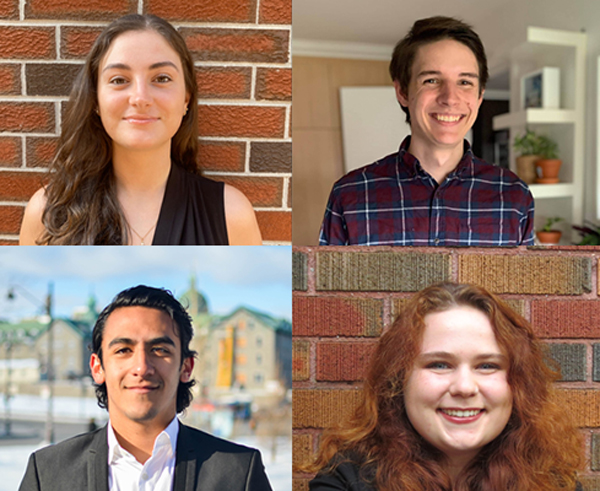COVID-19 didn’t cancel these summer internships
With economies locked down this past summer and companies reluctant to hire, for many students, internship opportunities looked rather grim. Despite the shutdown of the McGill campus, The Canadian Collaborative Centre for Genomics and Biomedical data(C3G) shifted gears and revved up for a summer of working from home internships.
For Solomia Yanishevskyto complete her Master’s of Health Bioinformatics at Dalhousie University, she either had to do an internship or write a thesis. Desiring practical experience, Solomia expanded her job search beyond Halifax, NS and landed at the Montreal node of C3G. After many companies backed out of their hiring intentions, of the 20 students in her program, she was one of only four to find an internship position. Over the summer, Solomia worked with the Data Team to generate artificial FHIR datasets to successfully test a data ingestion algorithm. She also mapped the mCODE data standard to C3G’s Phenopacket metadata service to broaden its compatibility. As part of Genome Canada’s Canadian COVID Genomics Network (CanCOGen) project, Solomia worked on integrating live COVID-19 data elements from six different sources into a cohesive framework, a project that is as ongoing as the global health pandemic. Seeing her work put to use and understanding how it integrated into the bigger picture, Solomia embraced the responsibility. She found the work environment highly collaborative and engaging. Her coworkers were welcoming and her mentor was patient to her learning process.
Not every Queen’s University computer engineering student can tell the difference between DNA and RNA, but
Soulaine Theocharides is the exception. Currently pursuing a secondary degree in biology, her summer work here at McGill (Queen’s University’s great rival) occupied the space at the intersection of the two fields. Working alongside the TechDev Team, Soulaine used computing clusters, Unix and Python to develop a searchable organizational structure for massive epigenomic datasets. Her project integrated databases and file hierarchies with genetic analysis pipelines. Soulaine rigorously documented her resilient data organizational structure so that it survives well beyond her internship.
McGill software engineering student Sebastian Ballesteros didn’t let his absence of genomic experience interfere with his summer. Instead, the novelty of genetics was a strong motivational factor for him. Leveraging previous internships working with computer graphics, Sebastian developed an online tool to visualize genomic variations as part of the Bento platform. He also transformed complicated genomic policy maps into a privacy assessment tool named D-Path (Data Privacy Assessment Tool) which allows data stewards worldwide to easily comply with regional regulations governing genetic data storage and use. Despite living in the McGill ghetto only a few blocks away from the C3G office, his internship was carried out entirely online. Though initially difficult to get a feel for his coworkers and associations, Sebastian found remote work good preparation for his current semester which is being taught entirely online. He loves Montreal’s unique personality, multi-cultural diversity, bilingualism and latin flair. With its strong university focus, good population density and available housing, he wouldn’t live in any other Canadian city.
After his school, Collège Ahuntsic, cancelled all their biotechnology laboratory technique internships, Étienne Collette’s summer was uncertain. During the previous semester at school, C3G Services Team Bioinformatics Manager François Lefebvre and C3G Bioinformatics Specialist Emmanuel Gonzalez had been guest lecturers, introducing his class to the computational side of bioinformatics. About to complete his DEC, during the three months when school was restricted to online theory classes, Étienne used the spare time to teach himself the C programming language. One thing led to another and a three week placement at C3G turned into a four month internship where Étienne engaged in no less than six different bioinformatic projects. Coming from an interdisciplinary background, the variety and concurrency were appreciated and stimulating. Along the way, he was supported by responsive feedback from the Services Team and daily updates with François. Étienne found purpose in the real-world detective work required by genuinely unsolved bioinformatic problems. He has just started studying biochemistry at l’Université de Montréal where he intends to specialize in genetics.
C3G and the Bourque Labat McGill University routinely hire students for summer internships. Many continue to work part-time beyond the summer as they complete their studies. We are a bilingual lab with people from many backgrounds, countries and skill-sets represented. Summer internships are posted around December with applications accepted until mid-February. Sometimes internships happen unexpectedly too. If you, or someone you know, is interested in learning beyond the classroom, drop us a line. See what happens, eh?

